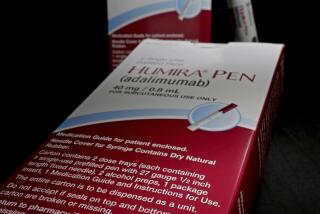Biotechnology Companies Meet Insurer Reluctance
- Share via
Biotechnology products are so new that many of the small companies that pioneered them cannot get product liability insurance to test and market them.
Many firms will be forced to abandon promising technology as a result, says Bruce Mackler, a lawyer for the Assn. of Biotechnology Companies, a trade group with several hundred members. Others will have “to go naked,” testing products without coverage and running the risk of being sued out of existence should a product have unintended effects, he said at a recent biotechnology conference in Boston.
Arthur V. Erickson of Johnson & Higgins, an insurance brokerage house in New York, warns that most biotech companies are so new and small “they’ll have trouble getting insurance not just because of price but because of availability.”
Among the companies finding insurance scarce, inadequate and costly is Marine Biologicals, a 4-year-old company in Seaville, N.J., that makes diagnostics to test for fever-causing bacteria in medical devices and injectable drugs. “Our (insurance) broker says it will cost about $5,000 a year to get only $300,000 in coverage, and he’s not even sure he can get that for us,” says Bob Mullen, vice president of Marine. “No one wants to touch it.”
Because biotechnology companies vary greatly in terms of their coverage needs, most insurance brokers will not specify an average cost. One broker said annual premiums for $10 million in coverage for a start-up company to test and market a drug under its own label could range “anywhere from several thousand dollars a year on up, to not available at any price.”
Others say that companies that were able to get insurance last year will find their rates three to eight times more expensive this year and that they will have higher deductibles and less coverage.
One reason for the high cost and short supply of insurance is that biotechnology products as a class have no track record, making them more expensive to protect.
Another is that product liability costs in general have been soaring because of accidents such as that in Bhopal, India, where a poison gas leak at a Union Carbide plant killed 2,000 people, and because of problems with products such as A.H. Robins’ Dalkon Shield intrauterine device.
In addition, the cyclical insurance industry is experiencing rough times that have forced it to raise rates, even at the risk of pricing some customers out of the market. With interest rates down, the industry no longer earns as much from money sitting in the bank. The strong U.S. dollar also has added to the squeeze by making the U.S. insurance market less attractive to insurance companies in England, which traditionally have helped supply American companies with coverage.
Larger companies involved in biotechnology, such as Du Pont and Monsanto, have not been affected as much as smaller companies because they have the size and safety record to give them clout with insurers. In many cases, they can afford to insure themselves.
Anne Camille Maher, a consultant for Chestnut Hill Biotechnology Associates in Woburn, Mass., says the problem is “just another example of a system that has to be set up for a new industry.”
The Assn. of Biotechnology Companies says it is working to educate the insurance industry about the risks of biotech products and to persuade insurers to offer coverage to pools of companies, much as they offered group insurance to the nuclear industry in the 1950s when it was unknown and untested.
According to a poll by the association, the kind of insurance smaller companies need most is insurance to protect them as they test drugs and take them to market. To the association’s surprise, it found that few companies say they want coverage for the accidental release of microbes into the environment.
More to Read
Inside the business of entertainment
The Wide Shot brings you news, analysis and insights on everything from streaming wars to production — and what it all means for the future.
You may occasionally receive promotional content from the Los Angeles Times.










